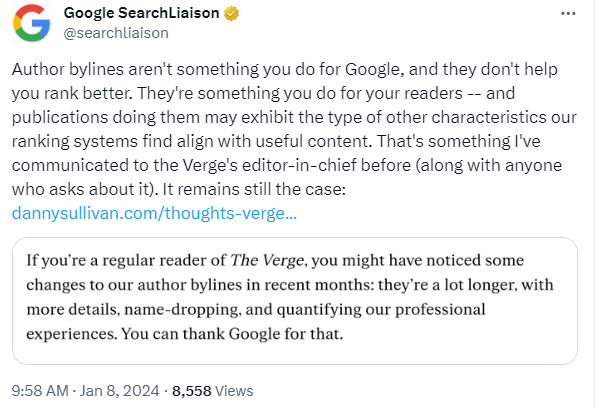What Is SEO Authorship?
In SEO, authorship refers to the idea that Google has some interest in who created a piece of content, perhaps as a means of establishing credibility and trustworthiness of the SEO content.
But does it matter for SEO??
Let’s dig in.
Why Is Authorship Important?
As we'll see below, for many years Google has shown an interest in associating content with known authors.
In addition, authorship indicates authority and trust that human users can use to gauge the validity of a piece of content.
After all, a blog post about your company’s security protocols would be more trustworthy coming from the COO than from a Client Success manager.
The History of Google Authorship
Google’s investment in identifying the authors of content began in 2007 with the filing of their agent rank patent. The patent outlined a scheme for “digital signatures” connecting an author to a piece of content, and how that might be used as a ranking signal.
Here are key developments in Google’s brief public experiment with Google Authorship in search results:
- 2011: In early spring, Google confirms that it supports the rel=“author” markup and recommends tagging authors with it for content they created.
- 2011: It started with verifying and associating authorship using Google+. Later that year Google began experimenting with a SERP rich snippet, displaying an author’s profile photo and link to their online content along with results for pages they had authored.
- 2013: Authorship results begin to decline in search results.
- 2014: Google announces the end of their experiment with showing author rich snippets in a Search Engine Land article that I co-wrote with Eric Enge after I was informed directly by Google that this was happening.
- 2019: Google ends the public version of Google+, also ending its experiment with dependence on author and publisher structured data implementation to verify authorship.
- 2020: Google files the Author Vectors patent that identifies authors through internet-based writing styles.
How Is Authorship Used in Search Today?
Even without supporting authorship markup, Google can still recognize an author and all of their web content when the author's articles link back to a central location.
At the 2016 SMX conference I had the opportunity to ask Google’s Gary Illyes if author identity was being used as a ranking signal. He responded that they were not, but didn’t rule it out entirely for the future.
However, at Pubcon in Austin in March 2023, Illyes reconfirmed that Google is still not using authors as a ranking factor.
Both times he remarked that Google was actively pursuing ways to better identify authors, but mostly for use as entities in its knowledge graph.
In January 2024, Google Search Liaison Danny Sullivan tweeted the following in response to a Verge article claiming they were "forced" to include author bylines because of Google's guidelines:
So it seems safe to say that Google has been pretty explicit and emphatic that the presence of an author byline, even that of a recognized expert, is not a ranking factor.
But this brings up a frequent question: if this is true, why does Google prominently mention the presence of a qualified author as a signal of high quality content for certain content types?
E-E-A-T, YMYL and the Quality Guidelines
Google's Search Quality Rater's Guidelines give strong emphasis to E-E-A-T (Experience, Expertise, Authority, and Trustworthiness) as primary characteristics of quality content, especially for YMYL (Your Money/Your Life) content, topics that have to do with health, news, finances, or anything that impacts personal well-being.
Here is how Google defines each part of E-E-A-T:
- Experience: degree of experience on the topic demonstrated in the content.
- Expertise: expertise demonstrated in the content
- Authoritativeness: the authoritativeness of the content creator (i.e. the author) and the content itself
- Trustworthiness: the overall trust of the content creator, the content, and the website
Understanding how Google works with its Search Quality Raters is key to understanding the role authorship plays in search today.
Google contracts and trains independent agents from around the world to serve as human evaluators of the quality of search results.
These evaluators are given actual web pages that Google ranks for a query and asked to evaluate it based on Google’s Search Quality Raters Guidelines.
Recommended Reading: What is Google E-A-T and YMYL in SEO?
Google uses the ratings by Search Quality Raters to determine how well its algorithms rank the content that the Guidelines identify as “quality” and “useful.”
However, Google has been very clear that the individual standards in the Guidelines should not be considered ranking factors. Instead, taken together, they are the common characteristics of pages Google would want to rank higher because they tend to be more useful and trustworthy for searcher.
Google search engineers take the raters' evaluations and use them to tweak elements of the search algorithms that actually are factors with the goal of ranking higher.
So many things mentioned in the Guidelines, such as author bylines and bio pages, are not looked at by Google Search as ranking factors, but rather are to be seen as typical characteristics of the kinds of pages Google wants to rank high, especially for YMYL queries.
Recommended Reading: Tips For SEO Content Writing
One Way Google DOES Use Authors
While Google does not use authors as a search ranking factors, known authors can and do still have a certain use in Google Search.
If Google can recognize an author as an "entity" it may use them in its Knowledge Graph to help organize search results. An entity is a person, place, thing or concept that Google can verify as existing and create vectors to all its associations across the web.
For example, "Empire State Building" and "New York City" are both known entities to Google, and Google's Knowledge Graph recognizes them as having a relationship.
Similarly, when Google recognizes a person as an author entity and can associate that entity with content they have created, they may display that content prominently when people search for that author.
For example, from time to time Google shows a knowledge panel result for me in the right sidebar of search results for my name:
Clicking on the icon at upper right or the "More about Mark Traphagen" button opens up a custom set of search results focused on just content I have produced across the web.
Even when that knowledge panel doesn't display, since Google recognized me as an author entity a search for my name shows that content prominently.
Why Should Enterprises Care About Authorship?
The most important takeaway for enterprise SEO is the more important the content, the more you should focus on it being trustworthy, which means involving real qualified experts in its creation.
Including authors in a byline and linking those bylines to dedicated author pages demonstrates that you care about providing your visitors with content they can trust.
So this is something you should do primarily for your users. Showing you care enough to create E-E-A-T content builds user trust around your brand.
But there is the peripheral search benefit of your content ranking when people search for one of your authors.
With the burgeoning interest in generative AI we are on the verge of an explosion of content like we’ve never seen before. Therefore anything you can do to stand out from the crowd in your content is critical.
Create Authoritative Content
Authorship is, of course, a small last step after you’ve created your authoritative content.
So, your first step is to create that authoritative content! This is where an AI content optimizer comes into play. One example of this is Content Fusion, which allows you to understand a topic and write about it with authority all at scale.
(Content Fusion tells you what you need to know to cover a topic authoritatively.)
- Recommended Reading:
Measuring the Performance of Authors’ Content
If you want to segment your SEO performance by author to see how one writer’s content performs compared to another, you can add your content to page tags.
In the seoClarity platform, you can bundle pages into custom groups and analyze the organic performance of the content within those specific groupings.
This is a great way to drill into organic performance in a view that’s meaningful to you. This can be especially useful for publishers who create a lot of content with a number of contributors.
Finding an Author’s Work on Your Site, At Scale
If you need to locate all pages on your site that were authored by someone in particular, you can turn to your website crawler.
A powerful site crawler will let you crawl your site based on custom criteria.
You can set up your crawler to extract the author name from the XPath — many websites build author names into their templates for blog or article pages.
This allows you to quickly find the content where a particular author has the byline.
Conclusion
Authorship in SEO may have had a rocky past, but it isn’t completely obsolete.
Sure, the author name will no longer appear on the SERPs, and Google+ is defunct, but adding an author to your blog content is still a way to enhance the user experience and build trust.
It’s a small step that can do a lot!
Editor's Note: This piece was originally published in April 2022 and has since been updated for accuracy.









2 Comments
Click here to read/write comments